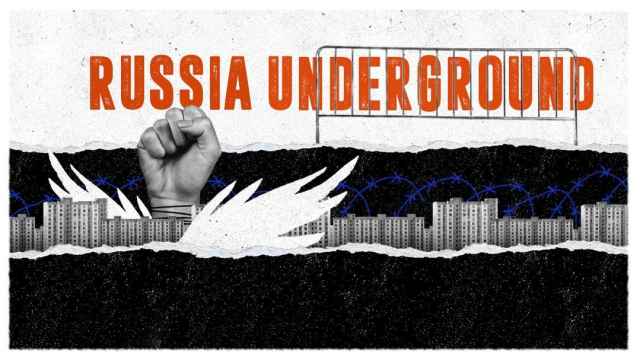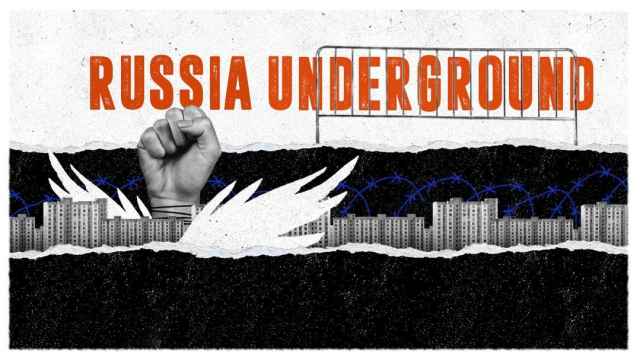Хандрить: to have the blues
Here in Moscow as we end our first week of self-isolation and contemplate another month — at least! — of the same, people are already getting a bit antsy. English speakers call this going stir crazy: being restless and distraught from confinement and isolation. The phrase originally came from England, where it meant becoming mentally unbalanced while incarcerated (stir is slang for prison). Another phrase in English is cabin fever, which appeared in the U.S. around 1900 and meant being restless, out of sorts, and distraught while living in an isolated cabin during a long winter.
You’d think that Russian would have equivalent expressions, right? Long winter? Check. Stuck inside for prolonged periods of bad weather? Check. Confined for months to a small cabin with 27 members of your multi-generational family and assorted livestock? Check. So in Russian that’s…
Actually, Russians don’t have an equivalent expression. When you look up the English phrases in dictionaries, you find descriptive definitions. Stir crazy is “сходящий с ума от скуки или бездействия” (going mad from boredom or inactivity) and cabin fever is “крайняя раздражительность и воинственность в результате одиночества” (extreme irritability and aggressiveness as a result of solitude) or “реакция на клаустрофобию” (reaction to claustrophobia) — neither of which is quite right. Plenty of parents with four kids, three dogs, and two cats who live in a 6-bedroom house with a living room, family room and game room are now going nuts from cabin fever. It’s being cut off from society that makes you crazy.
As usual, it isn’t that Russians don’t experience the same, or some of the same, reactions to isolation as their English-speaking fellow sufferers do. But they describe it a bit differently. They might experience тоска, a Russian word that is miserably hard to express in English. It is a deadly combination of ennui, restlessness, yearning, sorrow, anguish, anxiety, and depression that makes you either hit someone, throw yourself into a lake or write a thousand pages of magnificent prose or poetry.
If you want to experience a special kind of тоска (and self-loathing), read the list of what Alexander Pushkin wrote during three months of “self-isolation” at his family’s estate during a cholera epidemic in St. Petersburg.
Russian also has lots of ways to describe being confined в четырёх стенах (within four walls), which is, I guess, close to being stuck in a cabin or jail cell. The simplest way to describe it is with сидеть (to sit, be stuck): Я просто не могу уже сидеть одна в четырёх стенах! (I just can’t be cooped up alone within four walls!) Or you can close yourself off, literally and figuratively: Я закрылся в четырёх стенах (I retreated into my home.) Он замкнулся в четырёх стенах (He shut himself up in his house.) Or you can even immure yourself, which is very unpleasant indeed: Ты замуровал себя в четырёх стенах (You’ve locked yourself up in your own world and never go out.)
And then you can describe what happens to you while you’re home alone. It’s not pretty. Я стал сходить с ума в четырёх стенах (I started to go crazy cooped up inside.) Умираю от тоски в четырёх стенах (I’m dying of boredom and depression within these four walls.)
You get bored — really bored: Она соскучилась в четырёх стенах и неумело ищет развлечения, хоть какого-нибудь, которое отвлекло бы её от тягостных дум (She was bored to death cooped up inside and kept looking but not finding some pastime, anything that would take her mind off depressing thoughts.)
You get depressed: Мной овладело чувство обреченности ― там, в моих, пусть глупых, фантазиях, есть хоть какая-то жизнь, здесь же, в четырёх стенах, нет ничего, кроме мрака (I was overcome by hopelessness. In my fantasies, however silly, there is some kind of life, while here, caged up within these four walls, there is nothing but darkness.)
You get exhausted from doing nothing: Мы истомились в четырёх стенах, перестали интересоваться жизнью (Being stuck inside wore us out, and we stopped be interested in anything.) That can make you antsy and restless: Моя сестра и её муж очень тяжело переносят самоизоляцию, они мечутся в четырёх стенах, как звери по пещере (My sister and her husband have a really hard time with self-isolation; they are climbing the walls like animals in a cave.)
Some people give in and give up: Те, кто живёт дома с родителями, даже если у них есть работа, всё равно остальное время проводят запертые в четырёх стенах, бессмысленно смотрят телевизор или просто ничего не делают (Those who live with their parents, even if they have work, they still spend the rest of their time caged up at home, stupidly watching television or not doing anything at all.)
I think that might be Week Five.
But for most of us, it hasn’t gotten that bad. We’re just a bit blue, expressed by the verb хандрить. Сижу у себя в комнате, читаю и хандрю понемножку (I’m at home in my room, reading and feeling a bit blue.)
But sometimes you can enjoy your solitude, like this fellow: В блестящей, шумной столице Александр скучал, хандрил и сбежал к тихому уюту деревенского дома, к своему скромному кабинету, заполненному любимыми книгами (In the bright and noisy capital, Alexander was troubled and felt down, and so he hurried back to the cozy quiet of his wooden house, to his modest study filled with his favorite books.)
Не хандри! (Don’t be down!) We’ve got a long way to go.
A Message from The Moscow Times:
Dear readers,
We are facing unprecedented challenges. Russia's Prosecutor General's Office has designated The Moscow Times as an "undesirable" organization, criminalizing our work and putting our staff at risk of prosecution. This follows our earlier unjust labeling as a "foreign agent."
These actions are direct attempts to silence independent journalism in Russia. The authorities claim our work "discredits the decisions of the Russian leadership." We see things differently: we strive to provide accurate, unbiased reporting on Russia.
We, the journalists of The Moscow Times, refuse to be silenced. But to continue our work, we need your help.
Your support, no matter how small, makes a world of difference. If you can, please support us monthly starting from just $2. It's quick to set up, and every contribution makes a significant impact.
By supporting The Moscow Times, you're defending open, independent journalism in the face of repression. Thank you for standing with us.
Remind me later.






